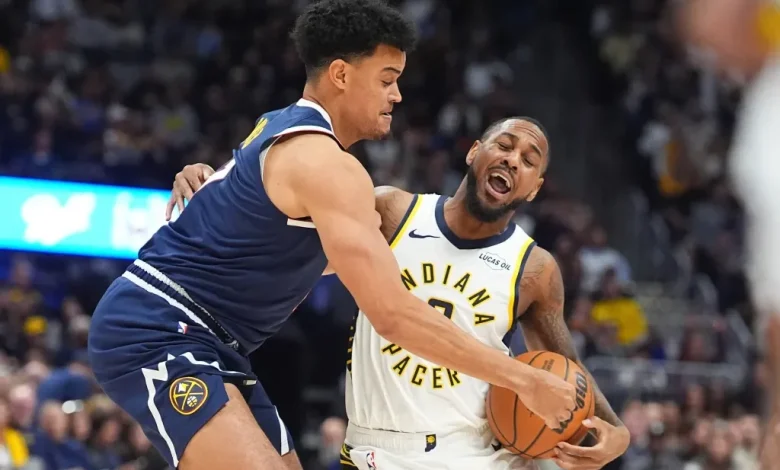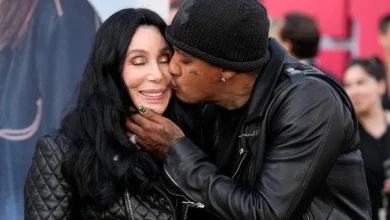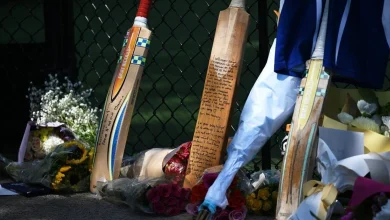How 2-way player Spencer Jones has emerged as defensive specialist option for Nuggets

SACRAMENTO, Calif. — Spencer Jones still needs to practice at least one technique before he can master his sporadic role with the Nuggets: Shedding his warm-up sweats and getting from the bench to the scorer’s table efficiently.
“I’m always kind of scurrying to get my pants off,” he said, laughing.
Alas, Jones doesn’t work for an auto racing pit crew, so no analytics exist to track his speed from seat to center court when David Adelman points his direction. That part is a work in progress. Otherwise, the 24-year-old Nuggets wing is thriving as an unheralded defensive specialist this season — his second with the franchise on a two-way contract.
What Denver asks of Jones requires the willpower to shift from complete inactivity to maximum intensity in seconds.
He checks into the game when the Nuggets need a stop — sometimes for a handful of possessions; sometimes for only one.
“You just have to come in, guard one of the better players out there,” he said. “You don’t really know when you’re gonna come in, when you’re gonna go out, what games you’re gonna play. So it’s just always being ready.”
It’s a daunting premise to be evaluated based on a few seconds of game time. But any role at this level is an indicator of success for two-way players, who aren’t part of the 15-man active roster. They split their time between the NBA and G League, prohibited from playing in NBA playoff games. Jones was Denver’s only returning two-way player this year after a solid rookie season with the Grand Rapids Gold (and 20 games of action with the Nuggets).
“I think Spencer earned the respect of the guys during the summer. … Guys who were around the gym came to understand what he was and what he is,” Adelman said. “It’s such a nice guy to have, that piece on your team that can come in and bring energy.”
Jones received “hints” from the staff that he might be used at random as a specialist going into this season, he said. Coaches will send him video clips of players he might be asked to guard for a possession or three on a given night. The clips are typically of talented on-ball scorers. He has taken on Devin Booker, Jonathan Kuminga and Pascal Siakam. The Pacers shot at a 1-for-9 clip last Saturday when Jones was defending the attempt.
Other times, he studies for a matchup scenario that never happens.
“It’s gonna be spotty,” he said. “It’s gonna be some games, some games not, just because we’re so deep. … (Coaches) don’t even know sometimes. It’s just how the flow of the game goes.”
At 6-foot-7 and 225 pounds with a dramatic wingspan, Jones has the physical profile to defend every position. Adelman called on Jones late in the first half of Denver’s home opener to corral Booker, a four-time All-Star who’s averaging a career-high 28.4 points per game so far this season. The Suns guard attacked Jones, trying to chisel his way into the paint with a left-hand dribble. But when he dropped the right shoulder into his defender, Jones didn’t budge. Nor did he when Booker spun and lowered his head into Jones’ chest.
Booker gave up on scoring too late. The Nuggets forced a shot-clock violation after he passed back out to Dillon Brooks. Jones returned to the bench. A hard day’s work had paid off in 24 seconds.
“He tries to go out there and implement everything the coaches tell us as far as physicality goes on the defensive end,” Peyton Watson said. “He has no ego. He’s not out there for him. He’s out there for the Nuggets and to help our team win games.”
At the end of a quarter in Minnesota recently, Julius Randle and Naz Reid were on the floor together, so Adelman brought in Jones to guard Reid. Aaron Gordon was matched up on Randle. Nikola Jokic was hidden on the smaller Jaden McDaniels. In this case, the Timberwolves didn’t dare force Jones into the action. They went at Jokic instead, bringing McDaniels up to screen for Randle and knowing Denver wouldn’t want to switch. Randle drove between Gordon and Jokic for a layup while Jones and Reid were in the backside corner.
Jones isn’t immune to mistakes. He’s still young and inexperienced, after all. Later in that Minnesota game, the Nuggets used their foul to give at the end of a quarter and subbed in Jones, who proceeded to commit a foul away from the ball. It gave the Wolves an extra point.
“It goes so fast. You don’t really want too many things clouding your mind,” Jones said when asked about his mentality as he removes his sweats and races to the table. “The mindset is everything (I do) before, in terms of what our game plan is, what I need to specifically do if I go in there. By the time you’re up there, you’ve been through it, you’ve run through it, so it’s time to just let it go.”
He is likewise doing his best not to dwell on the long-term goal that all two-way players share: earning an NBA contract. The Nuggets have a vacant 15th roster spot, which they could fill later this season in a number of ways — by making a trade, by signing a free agent on the buyout market, by promoting someone internally.
Jones would be the most compelling in-house candidate, considering he’s already playing more NBA rotation minutes than a handful of players on the 15-man roster.
“I try to keep it out of (my mind), but naturally it comes in your head,” he said. “But it’s all about just getting the minutes and proving yourself, and if you do that enough times, get enough trust, you’ll get that opportunity. But even if it’s not this year, you’re still trying for next year, stuff like that. So it’s not like I’m living or dying by it. But yeah, I try to keep it out of the back of my head as much as I can.”
Want more Nuggets news? Sign up for the Nuggets Insider to get all our NBA analysis.





